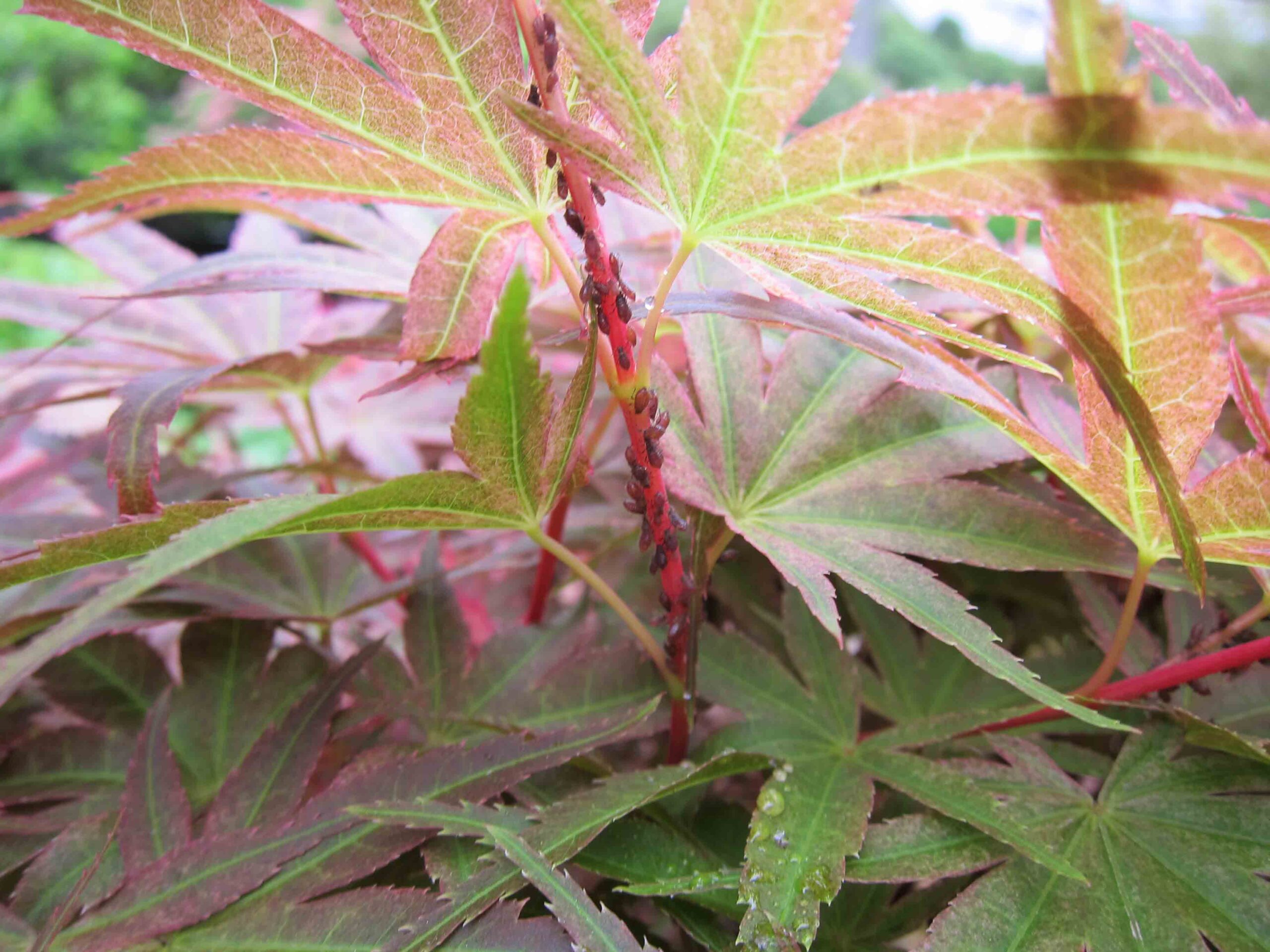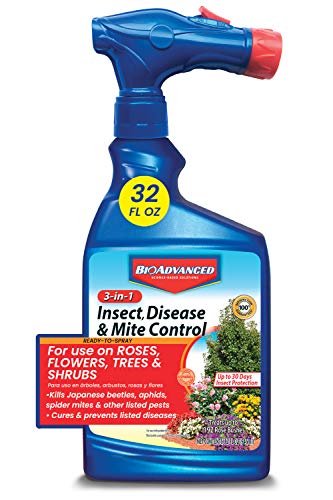Insecticide For Japanese Maple
The dwarf Japanese maple (Acer palmatum) is an ideal alternative for gardeners with limited space who still want the stunning fall colors associated with maple trees. These deciduous, compact trees range in size and grow in U.S. Department of Agriculture plant hardiness zones 5 through 8. As with their taller counterparts, dwarf Japanese maples are susceptible to many different diseases and insects.
Diseases
-
Various fungal diseases can infect dwarf Japanese maples and these diseases, including anthracnose, leaf spot, powdery mildew, leaf blight, verticillium wilt and rot. Anthracnose causes black spots with a tarlike appearance on infected leaves and occurs in wet, humid conditions. Leaf spots are identified by the discolored, irregularly shaped spots that develop on the foliage. Powdery mildew is one of the few fungal diseases that doesn’t require moisture to germinate and spread. It causes a powderlike growth to form on buds, stems and leaves, and infected foliage will curl and distort. Rots cause leaves to wilt and fall from the branches, stunts new growth, then branch dieback occurs and the tree begins to decline.
Insects
-
A wide array of insects use dwarf Japanese maples as a host plant, breeding ground and food source. Sap-sucking insects — such as spider mites, aphids, leafhoppers and scales consume the cell content coursing through the dwarf Japanese maple. Chewing insects — such as leaf-eating caterpillars — feed on the foliage of maple trees while wood-boring insects — such as carpenterworms and flathead borers — drill into the stems, branches and trunks of the infested dwarf maple. A few common signs of a pest infestation are chewed leaves that may have a ragged edge and tiny discolored dots on the foliage. Other signs of an infestation include yellow wilted leaves, premature leaf dropping and poor plant growth.
Control
-
Pesticides can successfully control certain types of diseases — such as leaf spot and powdery mildew — and most garden insects, such as aphids, scales and mites. When choosing pesticides, try to use the least toxic option available such as neem oil, potassium bicarbonate, insecticidal soap, bacillus thuringiensis and horticultural oils. These pesticides have a low toxicity level to humans, mammals and beneficial insects. Every type of pesticide has directions recommended by the manufacturer that you should follow to increase its effectiveness and prevent harm to the dwarf Japanese maple. For example, one brand of neem oil suggests mixing 2 tablespoons of the chemical with 1 gallon of water to create a solution that works as a fungicide and insecticide. For use as a fungicide, apply the diluted neem oil to all areas of the plant at seven-day intervals until the disease subsides. For use as an insecticide, spray the dwarf Japanese maple thoroughly when insects are present and repeat the treatment every seven to 14 days.
Prevention
-
Prevention is key to the dwarf Japanese maple disease and pest free, and requires good sanitation practices and proper cultural care. Since most fungal diseases occur when conditions are humid and excessive moisture is present, prune thick canopies to allow for good airflow. Air circulating through the dwarf maple helps promote quicker leaf drying which reduces the possibility of fungal diseases. Furthermore, remove plant debris that has fallen to the ground. This decaying plant matter provides a food source and hiding place for fungal pathogens and insects. Keep the area free of weeds, which can harbor insects. Ensuring the dwarf Japanese maple is healthy and vigorous goes a long way to protecting it from pests
Insecticide For Japanese Maple
Japanese maple is a beautiful tree that is often used as a garden specimen. It’s also a favorite of many homeowners who want to add some color to their yard or patio. But if you’re going to plant Japanese maple in your yard, you’ll need to know how to keep it healthy and looking its best.
The key to keeping your Japanese maple healthy is insecticide. If you don’t take care of the insects that prey on your tree, they’ll eat all of its leaves and cause other problems like disease. Insecticide can be applied using a sprayer or by hand-wiping the leaves with a cloth dipped in the liquid solution. This will kill all kinds of bugs including caterpillars, aphids, moths and beetles so that they can’t eat away at your tree’s leaves or cause damage to other parts like roots or bark as well!
List Of Insecticide For Japanese Maple
- INSECT KILLER – This pest control is great for use on adelgids, aphids, bronze birch borers, emerald ash borer, leaf miners, scale, and many other species of bug. Will also prevent new infestations.
- SOIL DRENCH APPLICATION – Concentrate dissolves in water allowing the insecticide to move through the root zone. Once in the roots, it moves up through the tree or shrub providing protection from insects. Also provides protection for new growth.
- FOLIAGE PROTECTOR – Designed for use on listed fruit, nut and ornamental trees and shrubs.
- WON’T WASH AWAY – Tree and Shrub Insect Control is rainproof within hours. For best results, spray with enough time for it to completely dry before it rains. Will not wash off after it has dried.
- EASY APPLICATION – Product quickly mixes with water and should be applied by pouring or with backpack, compression, knapsack or tank type sprayers. Carefully read and use according to label directions.
Additional Info :
| Color | LAWNGARD |
| Item Dimensions | |
| Height | 11.8 Inches |
| Width | 7.5 Inches |
| Length | 4.5 Inches |
| Weight | 8.2 Pounds |
- Insect killer: kills aphids, mealybugs, mites, white flies, and more
- Fast acting: kills listed insects in minutes and is effective against adult, larvae, and nymph stages of pests
- Easy to use: ready-to-use bottle makes application easy
- Use on: for indoor or outdoor use on roses, flowers, fruits, vegetables, and even houseplants
- For use on vegetables, flowers, fruits and houseplants
Additional Info :
| Color | Ready-to-Use |
| Item Dimensions | |
| Height | 10.5 Inches |
| Width | 4.8 Inches |
| Length | 2.3 Inches |
| Weight | 1.5 Pounds |
| Release Date | 2011-05-23T00:00:01Z |
- 12 MONTH PROTECTION: With just one application, kills listed insects and prevents new infestations for up to a year
- INSECT & PEST KILLER: Kills Japanese Beetles, Emerald Ash Borers, Adelgids, Leafminers, Aphids, and more
- SLOW-RELEASE FERTILIZER: Plant food and fertilizer improves the health of your trees and shrubs
- SYSTEMIC PROTECTION: Protects your potted and outdoor trees and shrubs from the roots to the stem of every leaf
- RESTRICTIONS: Not for sale in CT, MD & VT. Not for sale, sale into, distribution, and or use in Nassau, Suffolk, Kings and Queens counties of NY
Additional Info :
| Color | Granules |
| Item Dimensions | |
| Height | 11.3 Inches |
| Width | 3.6 Inches |
| Length | 7.3 Inches |
| Weight | 4 Pounds |
- 3-in-1 FORMULA: Insect, disease, and mite control for use on roses, flowers, shrubs, and trees
- INSECT KILLER: Army worm killer. Also kills Aphids, Spider Mites, Japanese Beetles, Caterpillars, and more
- DISEASE CONTROL: Fungicide controls Blackspots, Powdery Mildew, and more
- RAINPROOF PROTECTION: Systemic rainproof protection lasts up to 30 days
- COVERAGE AREA: Treats up to 190 rose bushes with the easy hose-attachment applicator
- RESTRICTIONS: Not for sale in NY, CT, MD & VT
Additional Info :
| Color | Ready-to-Spray |
| Item Dimensions | |
| Height | 11.25 Inches |
| Width | 2.55 Inches |
| Length | 5 Inches |
| Weight | 1.95 Pounds |
| Release Date | 2021-10-11T00:00:01Z |
- Used Book in Good Condition
Additional Info :
| Item Dimensions | |
| Height | 8.94 Inches |
| Width | 0.23 Inches |
| Length | 6.06 Inches |
| Weight | 0.51 Pounds |





